 October 2015 in “Medical Clinics of North America”
October 2015 in “Medical Clinics of North America” The document summarizes important skin care topics for non-specialist doctors, including treatments for skin conditions and the management of skin diseases.
 January 2012 in “Journal of Investigative Dermatology”
January 2012 in “Journal of Investigative Dermatology” Small molecule DMF improves psoriasis and multiple sclerosis, adult skin cells can be made to grow new hair, certain skin cells initiate hair growth, IL-17C controls gut health and can cause skin inflammation, and skin cells produce IL-17 that can lead to psoriasis.

Eye drops with β-blockers may cause hair loss.
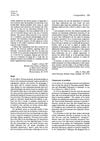 January 1989 in “Journal of The American Academy of Dermatology”
January 1989 in “Journal of The American Academy of Dermatology” Dr. Jorizzo questions the long-term benefits of minoxidil and tretinoin, while Dr. Olsen defends their effectiveness and stresses the need for public education on these treatments.
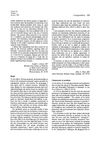 January 1989 in “Journal of The American Academy of Dermatology”
January 1989 in “Journal of The American Academy of Dermatology” Psoriasis patients have immune cells that respond more strongly to signals and stimuli due to an intrinsic cellular defect.
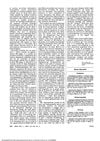
The dermatology book is useful but has some organizational issues.
 466 citations,
August 2004 in “Journal of the American Academy of Dermatology”
466 citations,
August 2004 in “Journal of the American Academy of Dermatology” Rosacea is a skin condition with unclear causes, classified into four subtypes.
 350 citations,
June 1989 in “The American Journal of Medicine”
350 citations,
June 1989 in “The American Journal of Medicine” Itraconazole is potentially effective for treating invasive aspergillosis, but more research is needed.
 198 citations,
October 2011 in “Journal der Deutschen Dermatologischen Gesellschaft”
198 citations,
October 2011 in “Journal der Deutschen Dermatologischen Gesellschaft” Use minoxidil for hair loss; finasteride and dutasteride for men, dutasteride for women.
 182 citations,
November 2017 in “Molecular Aspects of Medicine”
182 citations,
November 2017 in “Molecular Aspects of Medicine” The PDGF/PDGFR pathway is a potential drug target with mixed success in treating various diseases, including some cancers and fibrosis.
 165 citations,
February 1994 in “Fertility and Sterility”
165 citations,
February 1994 in “Fertility and Sterility” Flutamide is more effective and has fewer side effects than spironolactone for treating hirsutism.
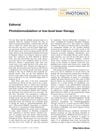 160 citations,
December 2016 in “Journal of biophotonics”
160 citations,
December 2016 in “Journal of biophotonics” Low-level laser therapy, now called photobiomodulation, is recognized for its broad medical applications and scientific backing.
 114 citations,
March 2002 in “Current opinion in oncology/Current opinion in oncology, with cancerlit”
114 citations,
March 2002 in “Current opinion in oncology/Current opinion in oncology, with cancerlit” Cancer therapy can cause various skin problems, including hair loss, skin darkening, painful hand-foot syndrome, and severe skin damage.
 84 citations,
November 2003 in “European journal of endocrinology”
84 citations,
November 2003 in “European journal of endocrinology” Women with androgenic alopecia are more likely to have polycystic ovaries and higher androgen levels, which may indicate PCOS.
 79 citations,
September 2018 in “Dermatologic therapy”
79 citations,
September 2018 in “Dermatologic therapy” Oral tofacitinib can significantly improve recalcitrant lichen planopilaris.
 77 citations,
June 2017 in “Advances in Therapy”
77 citations,
June 2017 in “Advances in Therapy” New treatments for Alopecia Areata, like JAK inhibitors, show promise for hair regrowth and are likely to change future treatment approaches.
 67 citations,
January 2007 in “Environmental health perspectives”
67 citations,
January 2007 in “Environmental health perspectives” A woman's health issues were caused by arsenic poisoning from kelp supplements.
 65 citations,
October 2008 in “Journal of Neuroendocrinology”
65 citations,
October 2008 in “Journal of Neuroendocrinology”  64 citations,
March 2006 in “Food Chemistry”
64 citations,
March 2006 in “Food Chemistry” The triterpenoids from Ganoderma lucidum can block testosterone effects and may help treat enlarged prostate.
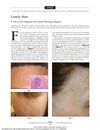 63 citations,
October 2011 in “Archives of Dermatology”
63 citations,
October 2011 in “Archives of Dermatology” Isolated long hairs at the original hairline can help diagnose Frontal Fibrosing Alopecia.
 63 citations,
March 2001 in “Fertility and Sterility”
63 citations,
March 2001 in “Fertility and Sterility” Diane 35 plus finasteride is more effective for treating hirsutism.
 63 citations,
March 2000 in “Annals of clinical psychiatry”
63 citations,
March 2000 in “Annals of clinical psychiatry” Some psychiatric medications can cause hair loss, but it usually grows back after adjusting the medication.
 58 citations,
January 2007 in “Dermatology”
58 citations,
January 2007 in “Dermatology” Minoxidil use in children may cause heart issues.
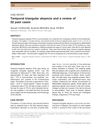 56 citations,
March 2010 in “Journal of Dermatology”
56 citations,
March 2010 in “Journal of Dermatology” Most cases of Temporal Triangular Alopecia are found in early childhood and may be related to genetic conditions.
 51 citations,
April 1999 in “The Journal of Steroid Biochemistry and Molecular Biology”
51 citations,
April 1999 in “The Journal of Steroid Biochemistry and Molecular Biology” Testosterone replacement may improve sexual desire and bone health in women with low androgen levels, but more research is needed on its long-term safety.
 49 citations,
October 1994 in “Annals of Oncology”
49 citations,
October 1994 in “Annals of Oncology” Minoxidil not effective in preventing chemotherapy-induced hair loss.
 48 citations,
January 2011 in “Hormone Research in Paediatrics”
48 citations,
January 2011 in “Hormone Research in Paediatrics” The conclusion is that genetic changes in the glucocorticoid receptor can lead to conditions affecting stress response, immunity, and metabolism, requiring personalized treatment.
 47 citations,
March 2016 in “Journal of dermatology”
47 citations,
March 2016 in “Journal of dermatology” Understanding the genetics of rare inherited ichthyosis syndromes is key for better treatments and genetic counseling.
 46 citations,
March 2013 in “Journal of Cosmetic and Laser Therapy”
46 citations,
March 2013 in “Journal of Cosmetic and Laser Therapy” Non-ablative and ablative fractional lasers helped hair growth in some cases without major side effects, but didn't work for all hair disorders.
 42 citations,
February 2014 in “Stem Cells and Development”
42 citations,
February 2014 in “Stem Cells and Development” Vitamin C helps adipose-derived stem cells grow and may support hair growth.






























